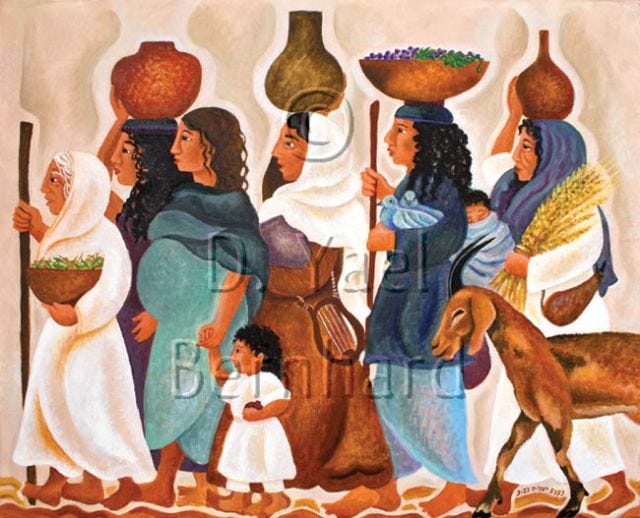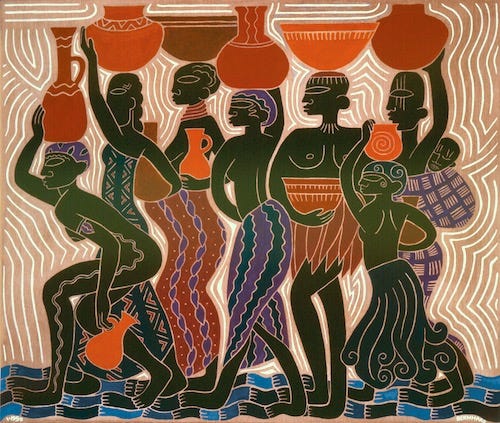Image of the Week: Imotenu (Our Mothers)

© D. Yael Bernhard
Imotenu is the cover image and the image for November in my newly-published calendar, The Jewish Eye Calendar of Art. The word means "our mothers" in Hebrew, and refers to a group of verses at the beginning of the Amidah, the heart of a synagogue service. Traditionally this recitation of gratitude to our ancestors was titled only Avotenu, which means "our forefathers" – but in more progressive congregations, our ancestral foremothers are included too.
And what amazing matriarchs they were. As in all tribal cultures, their lives were deeply connected to the land that sustained them. These were nomadic herders who moved from place to place. They were the wives of polygamist husbands – yet the women formed tribes of their own, sharing the tending of children and animals, the making of bread and beer, the gathering of wild berries and roots, the spinning of cloth and stories. Looking back, it's easy to idealize this earth-centered life, so deeply rooted in nature, especially when compared to our modern, technology-driven lives. I don't think I could live without the comforts and ease of my 21st century lifestyle – yet part of me looks with longing upon those simpler times, and wishes I could dwell with those women in their tents. Since the Torah encourages us to imagine ourselves among our ancestors, my mind has wandered there often, and so this painting was conceived.
It's not the first time I've cast a longing eye on the distant past. My development as an artist is rooted in an even more ancient beginning – our origins as a species in Africa. My early years as a painter were immersed in African art, history, and culture. For over twenty years my imagination lingered on the "dark continent" before it finally migrated to the fertile crescent of the Middle East. The above painting follows in the footsteps of this much earlier one, painted in 1990 and titled The Water Bearers:

This was a much larger painting than Imotenu, and shows women from all different parts of Africa, walking together in a stream of time, pulsing with a shared rhythm, as the African people do in their collective polyrhythms. In Imotenu, I focused more on the different roles of the women in this imaginary scene of migration from one grazing ground to another. I also made them individuals, more dimensional in appearance, and thought about their personality attributes as described in the Torah, and in Anita Diamant's historical fiction novel The Red Tent, which tells of the lives of Dina, daughter of Jacob, and her mother and many aunts. Dina is the toddler shown above, holding the hand of her aunt Rachel. To Rachel's left are Sarah and Zilpa; to her right are Bilhah, Leah, and Rebecca. These are the mother, grandmother, and wives of Jacob who bore him the sons that became the twelve tribes of Israel, from whom all Jews – and many Christians – are believed to be descended. They carry olives, grapes, barley, oil and herbs, a lyre, a water pouch, a growing child within, a baby in a cloth sash, and perhaps even a sourdough starter for making bread. They look to the future – from right to left, as in the Hebrew language that is read from right to left – walking into the unknown, and carrying traditions from the past.
I like to think of myself as walking in the stream of these women's footsteps, my feet joining a current much older than my own lifespan, and stretching far into the future. Walking the land in Israel, I felt myself as a tiny point along an immense arc of time – for history there is no relic, but something alive and unfolding, part of the collective consciousness of the Israeli people. I wish to honor my foremothers and forefathers who planted the seeds of the traditions that continue to evolve today, and who gave birth to the generations that gave birth to me. L'dor v'dor, as the expression in Hebrew goes – from generation to generation. We remember, and we are part of what will be remembered by our descendants.
The Jewish Eye 5784/2024 Calendar of Art is available in my webstore ($20 with shipping included) or on Amazon ($16.95). If you want to purchase this calendar, please consider buying it directly from me, as Amazon takes a substantial cut. If you buy it from Amazon, please consider writing a review! This is very helpful in pushing the calendar up in Amazon's search engine.
You can view the entire calendar here.
The original painting of Imotenu is for sale. Please inquire for more information.
A good week to all!

D Yael Bernhard




